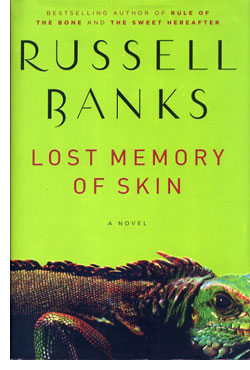 |
 |

Russell Banks
Lost Memory Of Skin
Reviewed by: Rick Kleffel © 2011
Ecco / HarperCollins
US Hardcover First Edition
ISBN 978-0-061-85763-8
Publication Date: 09-27-2011
416 pages; $25.99
Date Reviewed: 10-17-2011
Index:
General Fiction
Mystery
The Kid lives under the Causeway in a colony of homeless sex offenders, but he doesn't seem like such a bad fellow. He's innocent and wry, uneducated and under-socialized. Eventually, the Kid meets the Professor, a shambling, morbidly obese academic who hopes to study homeless sex offenders, and asks to interview the Kid.
Readers want to find out the same information the Professor seeks; who is the Kid, and what did he do to end up here? By the time we begin to learn the Kid's history, it is clear that the Professor has his own secrets. 'Lost Memory Of Skin' by Russell Banks is an extended exercise in cognitive dissonance, with mystery and sympathy persuading the reader to enter perspectives and worlds that might by definition seem repellent.
Banks manages to turn the Kid's story into an engaging and even compelling novel by employing precisely honed prose in the service of what might best be described as social surrealism. He portrays people, landscape and social conditions with a gritty sense of detail that puts the reader right on the ground. But he avoids giving his characters proper names. Instead we get to know them by nicknames, and this unusual combination lends the whole reading experience a sheen of archetype and fairy tale. 'Lost Memory Of Skin' is brighter than life, but no less real.
Prose and character are closely merged in the novel, told mostly by the Kid, but as well by the Professor. Banks' prose is so lucid and so limpid, that there is a truly visual, almost visionary feel to the book. The Kid may not be very bright, or at least he's clearly unschooled. But he's clever and witty. He views his situation with a resignation that brings with it a very dry sense of humor, and reading his portions of the novel, watching his mystery unfold, is truly a page-turning pleasure.
The Professor is no less enjoyable to follow, but he's a very different kettle of fish. He's a gourmand, an over-consumer of every aspect of his own life, from the food in his super-sized refrigerator to the wildly unreliable web of relationships he claims to have. Banks is superb at upending our expectations of both characters. Moreover, his supporting cast is equally memorable and perfectly integrated into the character-driven plot. This is a book where every scene is a good scene.
Banks is a smart writer who uses the archetypes and folk-story motifs here to give the hard-as-nails specifics a softer tone that suffuses the interwoven character narratives and an accessibility that they might not otherwise have. There's more than a touch of 'Treasure Island' here; it's referred to in the story and the Professor uses promises of treasure to keep the Kid engaged. For readers, the folk-tales and archetypes add what can best be described as a sort of joy to a story of Internet-tainted innocence cast into an uncaring world. There is not a word in this book that is dour, even if some members of the supporting cast are truly chilling folks.
Banks knows that his hard conditions needs must bring about hard endings, and as the pasts unravel, lives do as well. The mystery at the heart of the novel — How can we know just who those around us are? — gets grounded in some unique and memorable scenes. The title of the book is no accident. Banks, by providing the reader with visionary, archetypal perspectives, explores the memories of his characters and how their stories define their lives even as those stories enter our memories.
Readers will not remember reading this book so much as they will remember what they read, as if it had somehow happened to them. They will be reminded that there is good to be found even in places where our hearts tell us it cannot exist. We can look at every human being we meet, and think we know them. But when we hear their story, when we listen to their story, when we experience their story in words, it is the language that will make the story real.
|
 |
|
|
 |
| |
Review Archive
All Reviews alphabetized by author.
General Fiction
Non-Genre, general fiction and literature.
Horror
Supernatural fiction, supernatural horror and non-supernatural horror.
Science Fiction
Science fiction, science fantasy, speculative fiction, alternate history.
Fantasy
Fantasy, surrealism and magic realism.
Mystery
Crime, thrillers, mystery, suspense.
Non-Fiction
Non-Fiction, True Crime, Forteana, Reference.
Poetry
|
|
 |
|




